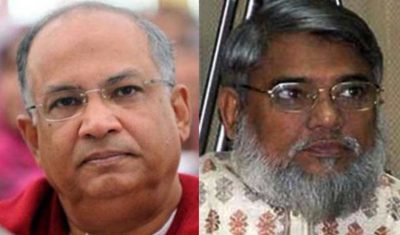By
Sheuli Akter
Bangladesh’s highest court has dismissed the final review petitions of two war crimes for death row inmates paving the way for their executions.
Chief Justice Surendra Kumar Sinha, who chaired a four-judge bench, pronounced the verdict at 11:30 am local time in a crowded courtroom amid tight security.
The court rejected their petitions and upheld its previous verdicts on the 67-year-old Ali Ahsan Mohammad Mojaheed, secretary general of the Bangladesh Jamaat-e-Islami party, and about 66-year-old Salauddin Quader Chowdhury, a leader of the Bangladesh Nationalist Party (BNP), for crimes against humanity during the country’s war of independence in 1971.
After the apex court dismissed the opposition leaders’ petitions, Attorney General Mahbubey Alam told journalists that there is no legal bar to execute condemned killers unless they seek presidential pardon.
Advocate Khandaker Mahbub Hossain, principal counsel for both opposition leaders, said he will seek a chance to meet his clients who are now behind bars to know whether they will seek presidential pardon.
Sources said if they decline to seek presidential mercy, the jail authorities would allow them to meet members of their families before their executions.
They said if they file petitions seeking presidential reprieves, the jail authorities will wait until the president gives his decision. Later, they said the government will set the date for their execution.
The death row inmates filed final review petitions with the Supreme Court on Oct. 14 against its verdicts that upheld their death sentences for war crimes in 1971.
Earlier in August, 2013 the International Crimes Tribunal (ICT)-2 awarded a death sentence to Mojaheed who was a a Cabinet Member in the government of former Prime Minister Khaleda Zia in 2001-2006.
Later in October 2013 the International Crimes Tribunal (ICT)-1 issued the death penalty verdict against Chowdhury who also served as the adviser of parliamentary affairs to the former Prime Minister Khaleda Zia in 2001-2006.
Chowdhury’s BNP and Mojaheed’s Jamaat have dismissed the tribunals as a government “show trial” and said they are set-up domestically without the oversight or involvement of the United Nations.
Almost 40 years after the 1971 fight for independence from Pakistan, Prime Minister Sheikh Hasina, the daughter of Bangladesh’s independence hero Sheikh Mujibur Rahman, established the first tribunal in March 2010.
The Hasina government says about 3 million people were killed in the 9 month war. Bangladesh was called East Pakistan until 1971.
In April this year, Muhammad Kamaruzzaman, also a leader of the Bangladesh Jamaat-e-Islami party, was executed for crimes against humanity committed during the country’s war of independence in 1971.
Another Jamaat leader Abdul Quader Molla, also convicted of war crimes, was executed on Dec. 12, 2013.


